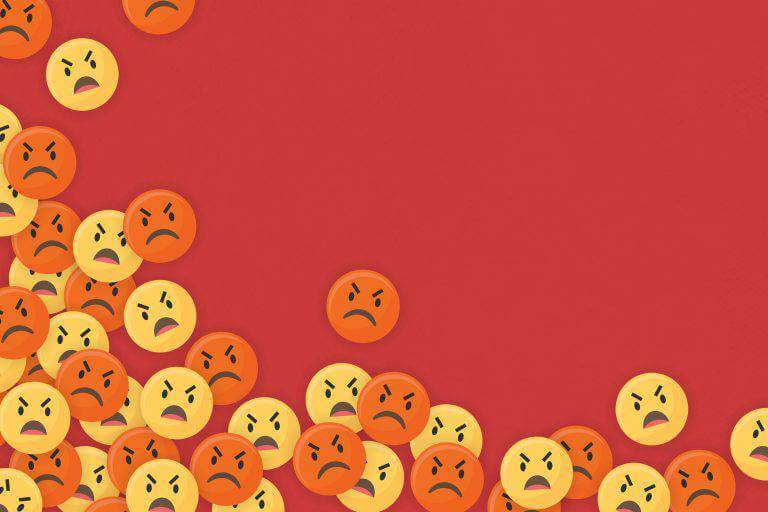Anger is a normal human emotion and can even be useful at times if channeled in a helpful way. However, when it becomes strong, frequent and lasts for a long time it can have a major impact upon relationships, studies, work and our general wellbeing. In these cases, expert Anger Management counselling, therapy or CBT, delivered by a trained psychologist, counsellor or therapist might be what you need to help you manage such a powerful emotion in a way which is not harmful. In this page you’ll find helpful information about anger issues and help to find a counsellor or therapist to to start making a lasting positive change.

Anger is one of the many emotions we are equipped with since birth. Being angry is not always “bad”: our anger can be a signal that we feel hurt, and can emerge out of frustration, sadness or desperation. It can be helpful in motivating us to change and help us defend ourselves in dangerous situations. But it can also become a debilitating problem.
1- Physical Symptoms of Anger
These are experienced as a result of a stress response activated in the body when we feel angry
2- Behaviour Symptoms of Anger
These are often targeted in Anger Management Counselling, Therapy and CBT
3- Emotional & Cognitive Symptoms an Anger Issue
Following an angry episode we may feel guilty for our actions, we may feel low and consequently withdraw from others. Alternatively some people blame others for their anger and so may not have strong feelings of guilt.

The short answer is yes: psychological, talking therapies are effective in treating Anger Management problems. Several studies have demonstrated that whatever the type of therapy or counselling, there is a strong effect on the reduction of symptoms. In particular, Cognitive Behavioural Therapy (CBT) for Anger problems has shown a 76% success rate in reducing anger scores [1].
At Therapy Central, when working with anger, in counselling, therapy or CBT, our therapists can help you to explore what might be contributing to your anger and start by addressing this. We can help you to identify the triggers to your anger so that you can take action to manage your anger in a constructive manner before it escalates. It is possible to see some quick results.
Although it may feel that your anger is completely uncontrollable, our anger therapists, psychologists and counsellors can introduce you to coping strategies to use when your anger builds to help you feel more in control. Your anger therapist may draw upon Cognitive Behavioural Therapy (CBT) which has been shown to be a helpful therapy approach to address anger. CBT for anger management will involve exploring with you what thinking patterns and actions keep your anger going and help you to make positive changes to these.
The diagram below is an example of a CBT vicious cycle for anger that we can support individuals to breakdown and reverse. With therapy for anger management you will feel more able to control your anger and bring more balance to your emotions and choice to your behaviour.


If you are looking for anger management therapy in Central London, at Therapy Central we can help you learn the strategies you need to start controlling your anger, understand its causes. As a result, you’ll be enabled to make the crucial changes to bring balance and fulfilment back into your life.
It’s not easy to recognise that you might have an anger management issue, but remember that you are not choosing to be angry, and thus it’s largely not your fault to feel the way you do. You are not alone.
Get professional help with Anger Management issues in London today. Contact us for a free 15 min consultation with an Anger Therapist to see if our help would fit your needs. You can also get in touch via email at info@therapy-central.com or call us at (+44) 020 348 82797.
Our comfortable and confidential therapy rooms are conveniently located 3 min walk from Oxford Circus station, in Central London (see map below). Change starts with Talking!
Further Helpful Resources For Managing Anger:
NHS Controlling Anger PDF
Anger Self-Help
Anger Coping Strategies PDF
Other issues we work with at Therapy Central
Learn more about how CBT works
Image Credits:
Background vector created by rawpixel.com – www.freepik.com
Business vector created by dooder – www.freepik.com
Home vector created by freepik – www.freepik.com
Dr. Amy Smith, Counselling Psychologist
Dr Raffaello Antonino, Clinical Director, Counselling Psychologist
References:[1] Saini, M. (2009). A meta-analysis of the psychological treatment of anger: Developing guidelines for evidence-based practice. Journal of the American Academy of Psychiatry and the Law Online, 37(4), 473-488.